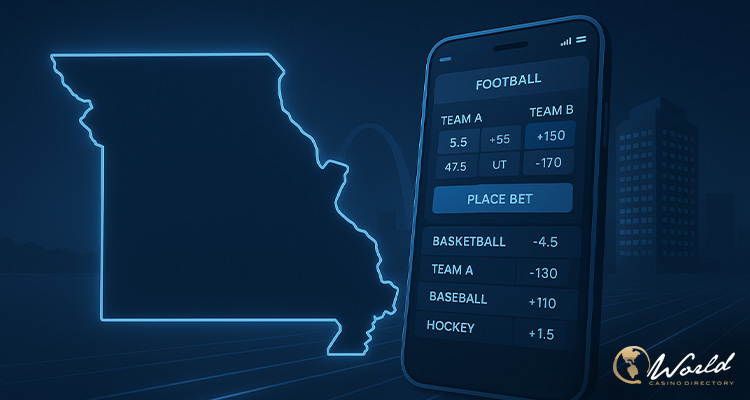As Missouri moves toward its long-anticipated sports betting debut on December 1, 2025, major developments are unfolding in the race to secure licenses. Among the most coveted opportunities are the two untethered online sportsbook licenses, which allow operators to bypass traditional partnerships with local casinos or sports teams. These licenses are seen as prime assets by national brands such as FanDuel and DraftKings, both of which have officially submitted their applications.
The Missouri Gaming Commission (MGC) has confirmed receipt of three applications so far, with FanDuel and DraftKings among the earliest to act, according to Sports Betting Dime. These untethered licenses stand out for their independence—recipients are not required to share revenue with Missouri-based partners, offering more autonomy and potentially higher margins. The application window closes on July 15, and selections are expected to be announced by August 15.
The Push Toward Launch: Key Milestones and Legal Backdrop
Sports betting was legalized in Missouri through Amendment 2, which passed in November 2024 with just over 50% of the vote. Backed by a coalition of the state’s professional sports teams and major sportsbook operators, the initiative gathered more than 300,000 signatures to make the ballot. Despite its success, the rollout has been delayed due to procedural disputes, particularly when Secretary of State Denny Hoskins blocked emergency rulemaking earlier this year, arguing the process lacked justification. This decision forced regulators to adopt the standard, slower rulemaking path, setting the official regulation adoption date for August 30.
Until then, the MGC is conditionally moving forward with certain aspects of the licensing process, including awarding untethered licenses ahead of finalized rules. A public comment period ends July 16, and a hearing is scheduled for July 17 at MGC headquarters in Jefferson City, where stakeholders will offer input on regulatory policies.
Market Access Strategies: Partnerships Take Shape
While FanDuel and DraftKings are targeting untethered entry, other operators are aligning with Missouri’s casinos and sports franchises to gain market access. BetMGM recently finalized a partnership with Century Casinos, which will grant it both retail and online betting capabilities. This collaboration ensures BetMGM’s presence in the market when operations begin in December.
Similarly, bet365 secured its entry by forming a multi-year agreement with the St. Louis Cardinals earlier this year. The partnership designates bet365 as an Official Betting Partner, enabling it to operate in Missouri without pursuing an untethered license.
Underdog Fantasy, traditionally known for its DFS offerings, has also applied for both online and retail betting licenses. While the company has not disclosed a specific market access partner, its dual application signals a broader ambition to transition into full-scale sports betting.
Industry Interest and Competitive Positioning
Though the state will eventually allow up to 14 online sportsbooks and 19 retail licenses, only two of the online licenses are untethered—making the current application process a high-stakes competition. Industry analysts widely believe that FanDuel and DraftKings hold an edge due to their financial backing and active involvement in the legalization effort. Both companies were major contributors to the Winning for Missouri Education campaign, lending them credibility and visibility with regulators.
Additional operators expected to enter the fray include Caesars Sportsbook, ESPN BET, Bally Bet, and Fanatics, all of which are rumored to be seeking partnerships with Missouri casinos or teams. Each tethered operator must complete its application by September 12, and full market access agreements must be finalized by that time.
Regulatory Structure and Tax Implications
Under the state’s regulatory framework, licensed sportsbooks will be subject to a 10% tax on adjusted gross revenue. Up to 25% of wagers may be deducted via promotional credits such as bonus bets, and losses can be carried forward to offset future profits. Revenue from this tax will first cover regulatory expenses, with a minimum of $5 million—or 10% of remaining funds—allocated to compulsive gambling prevention. The balance will support public education across K–12 and higher institutions.
Oversight of the sports betting industry in Missouri falls to the MGC, which will enforce compliance, licensing standards, and responsible gambling policies. The Secretary of State also plays a role in reviewing the Commission’s rule proposals.
What Lies Ahead
As Missouri nears its December launch date, the coming weeks are critical. The July 15 deadline for untethered license applications will be followed by a public hearing and then the August 15 announcement of the two recipients. Meanwhile, tethered applicants have until September 12 to finalize their submissions. Once the rulebook becomes official on August 30, operators will be cleared to prepare for launch.
Retail sportsbooks are expected to appear at Missouri’s 13 licensed casinos and potentially at venues for the state’s major sports franchises. Among the likely locations are Arrowhead Stadium, Busch Stadium, and the Enterprise Center.



